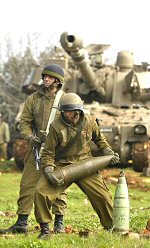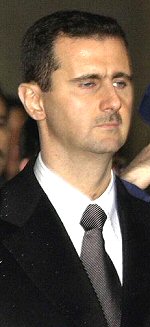Untitled Document
 |
The IDF is bolstering its
strength on the northern border |
US Secretary of Defense Donald Rumsfeld is considering provoking a military
confrontation with Syria by attacking Hizbullah bases near the Syrian border
in Lebanon, according to the authoritative London-based Jane's Intelligence
Digest.
In an article to be published on Friday, the journal said multi-faceted US
attacks, which would be conducted within the framework of the global war on
terrorism, are likely to focus on Hizbullah bases in the Bekaa Valley of eastern
Lebanon.
It noted that the deployment of US special forces in the Bekaa Valley, where
most of Syria's occupation forces in Lebanon are based, would be highly inflammatory
and would "almost certainly involve a confrontation with Syrian troops."
Such a conflict might well prove to be the objective of the US, said the journal,
which described Washington's strategic benefits from a confrontation with Syria.
These include:
* Pressuring Damascus into ending its support for anti-Israel Palestinian groups;
* Persuading Syria to abandon its weapons of mass destruction and to withdraw
its troops from Lebanon;
* Stimulating a situation where Syrian leader Bashir Assad can be ousted;
* Crushing Hizbullah and ending its presumed connections with al-Qaida.
"The political consequences of a US attack against Lebanon. . . could
result in the destabilization of a country that is still rebuilding its infrastructure
a decade after a ruinous 15-year civil war," noted the journal. 
"It would also fuel Muslim and Arab hostility toward the US at a time
when US-led occupation forces are fighting the ongoing insurgency in Iraq.
"In these circumstances, taking on Hizbullah in the Bekaa Valley is likely
to prove a highly risky undertaking.
"However," it continued, "given the Bush administration's doctrine
of pre-emptive strikes, it remains entirely possible that Washington will soon
launch military strikes against Lebanon, regardless of the consequences for
wider regional stability."
The journal noted that the US administration has long considered Damascus "a
prime candidate for regime-change," along with Afghanistan, Iraq, Iran
and, possibly, Saudi Arabia.
"Syria, once a powerhouse of Arab radicalism that could not be ignored,
has been seriously weakened, both militarily and politically. Washington may
feel that the time is coming to oust Assad and the ruling generals.
"Targeting Syria via Lebanon, the only concrete political influence Damascus
has to show following decades of radical diplomacy, could prove to be a means
to that end."
The journal also noted that, "there is reason to believe that Iran and
the US are moving toward some form of tactical understanding as a consequence
of covert diplomacy." As a result, it said, Teheran has been steadily reducing
its support for the regime in Damascus.
The journal added that Bashir Assad lacks both the ruthlessness and political
acumen of his father, Hafez, whom he succeeded in June 2000, and he is constrained
by members of his father's old guard who are continuing to block his tentative
efforts at reform.
"These factors make Damascus vulnerable to pressure from both the US and
Israel, particularly since US forces are deployed in Iraq, Syria's eastern neighbor."
During the past six months, it added, Washington has increased the US military
presence along the Syrian border with Iraq "and, on several occasions,
has sent special forces into Syrian territory or penetrated Syrian air space.
"In one incident, US troops pursued suspected Iraqi militants into Syria
and fought a running battle that left dozens of people, including some Syrians,
dead.
"Israel's air-strike in southern Lebanon earlier this week," it added,
"is very unlikely to be the last time Israeli forces cross the border to
strike at targets alleged to be militant bases and training camps."

